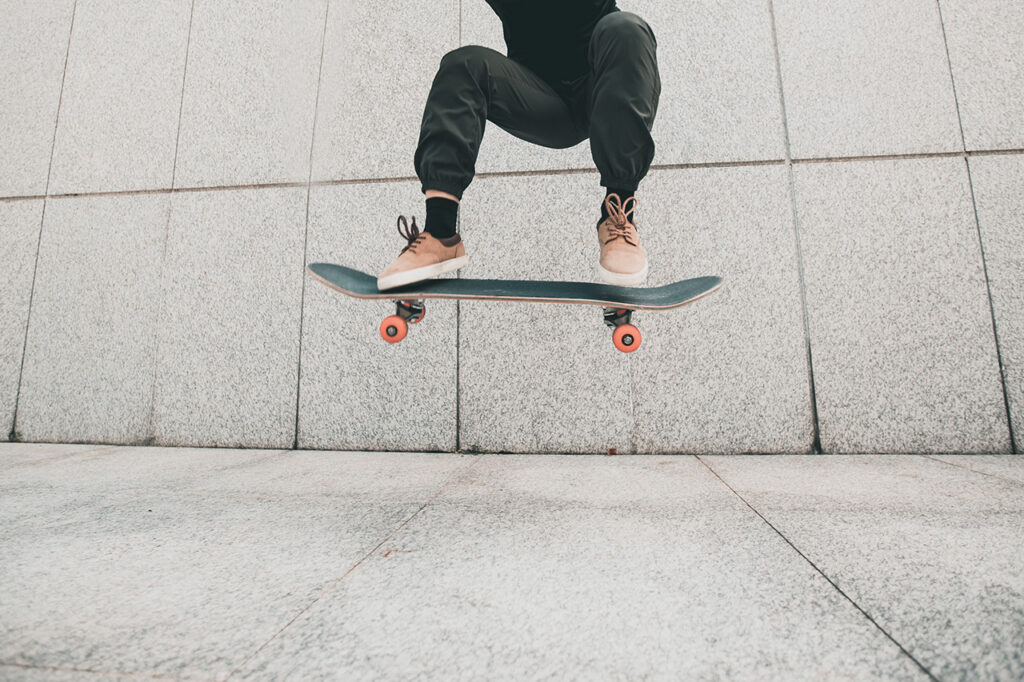[LUM#20] The city caught in its own game
Preferring public spaces to skate parks, urban skateboarders take over the city, repurposing street furniture to perform their tricks. The city benefits from this experience, which promotes physical activity in an urban environment.

Skate parks have had no effect. Skateboard and BMX enthusiasts continue to slide along benches or stair ramps. "The attempt by public authorities in the 1990s to confine these activities to dedicated areas, as is the case for all sports (stadiums, swimming pools), has never prevented riders from continuing to practice in public spaces. This stems from a misunderstanding of the importance of the urban experience in this practice," explains Thomas Riffaud, a sociologist at the Santesih laboratory1 laboratory at the University of Montpellier. "Repurposing street furniture, performing tricks in spaces that are not designed for us, playing with the gaze of passersby—all of this contributes to the adventure of urban skating, " says the man who has been surfing sidewalks for a long time.
"This practice reconnects us with the city."
Treating the city as a playground is also a form of resistance to the norm of urban management that focuses on the efficiency of traffic flows. Skaters disrupt the planning of people's movements and transportation. By taking over public spaces for the duration of a skate session, they even challenge the French idea of public space as belonging to no one, according to Thomas Riffaud: "Skateboarders, on the other hand, explain to us that public space belongs to everyone, including them. It's a vision that energizes public spaces, which are increasingly deserted today precisely because fewer and fewer people are appropriating them." This approach is also found among graffiti artists.
"In terms of the body, this practice reconnects people with the city because it involves a very precise knowledge of the urban environment," emphasizes the researcher, who claims to be able to recognize Montpellier's Albert 1er and Comédie squares by the distinct sound made by skateboards in these two spaces. His sociological surveys of riders show how all the senses are involved in their choice of location: sight for the form and potential of tricks, but also touch for the glide, and even smell to assess whether the experience is worth putting up with the stench, for example. "Adapting to an urban environment that can sometimes be hostile creates an intimate relationship with the city, a real affection for the place where you live," he comments.
History proves skateboarders right
Rather than a political claim to public space, Thomas Riffaud prefers to talk about an " intuition" to describe riders' opposition to the established urban order. "The interest is also in taking a positive view of the conflictual relationships between skateboarders and other residents: diversity in public spaces creates friction, but that's precisely where we learn to live together. " And history proves the skateboarders right. More and more municipalities, known as skate-friendly cities, are using these activities to revitalize deserted public spaces. While this movement is most visible in Northern Europe and Australia, it is gradually arriving in France. In Bordeaux in particular, after negotiations with local residents, the city center squares are open to riders at designated times. "The specifications for street furniture are beginning to take this into account: benches must not only accommodate onlookers but also be sturdy enough to be used for skating!" says the enthusiast. He is well aware that some municipalities continue to ban skateboarders with fines or deliberately hostile urban equipment, such as spikes and ridges installed along surfaces suitable for skating.
"In a country that encourages people to do more and more sport, and at a time when the population has never been so urban, it's obvious that we need to make room for physical activities in the city," concludes Thomas Riffaud, who also points out that skateboarders help to promote a positive image: "The perfect photo—a beautiful trick in a beautiful location—is the trophy that skateboarders strive for. And with the advent of social media, they play a major role in promoting a positive image of the body in urban spaces."
Find UM podcasts now available on your favorite platform (Spotify, Deezer, Apple Podcasts, Amazon Music, etc.).
- Santesih (UM)
↩︎